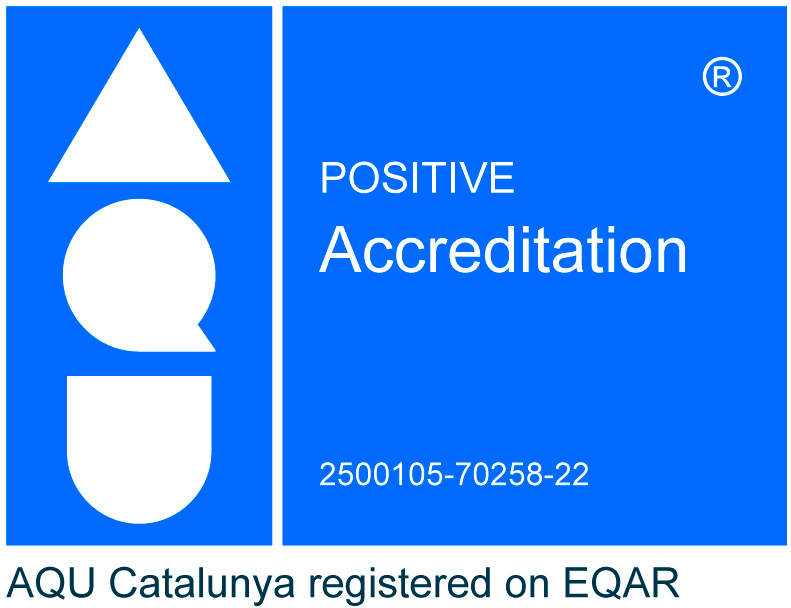Bachelor's Degree in Medicine
The Bachelor's Degree in Medicine is the first of its kind in Spain to be accredited by the WFME
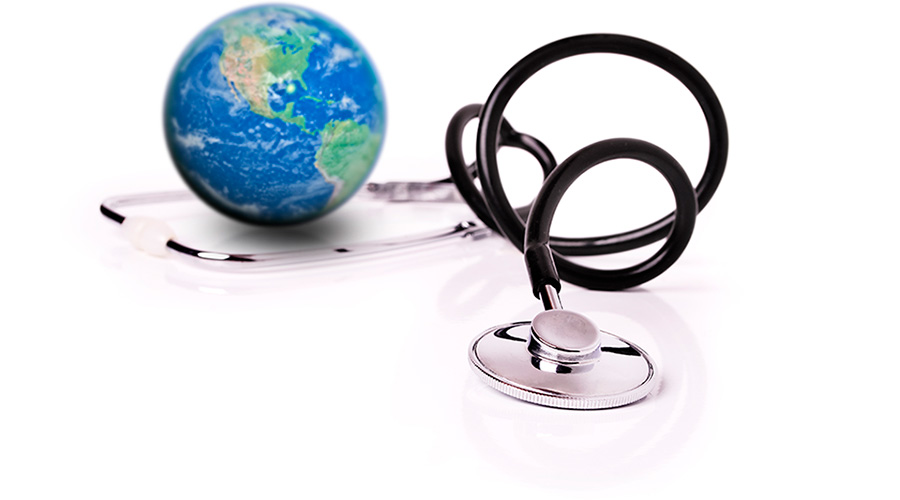
At UIC Barcelona, you are what matters
*According to the Ministry of Education and Vocational Training.
Mission of the degree in medicine on medical training
The Mission that the Department of Medicine of the Faculty of Medicine and Health Sciences has established for the degree in Medicine is:
"Transform the world of Medicine through training, research and transfer, to serve society, with personalized attention to students and faculty."
This mission is specified in:
- Training in a personalized medicine,
- Teaching to provide proactive care, ensuring continuity of care,
- So that they know how to establish a doctor-patient relationship based on empathy, compassion and a vocation for service,
- With a holistic view of the person,
- And a comprehensive approach that includes not only diagnosis and treatment but also prevention, attention to social problems and the patient context, and decision-making.
And compliance is guaranteed by reaching the learning results identified in the degree certificate verification memory, and also specified in the teaching guides for each of the subjects.
On the other hand, the Vision of the Department of Medicine of the Faculty of Medicine and Health Sciences is:
"To be an international benchmark in the medical context, through high-quality, professional, and student-oriented training".
And it focuses on the following values:
- Technical and human excellence
- Professional prestige
- Own and innovative teaching methodology
- Talent attraction and retention.
Practice in national and international institutions from year 1
Universities
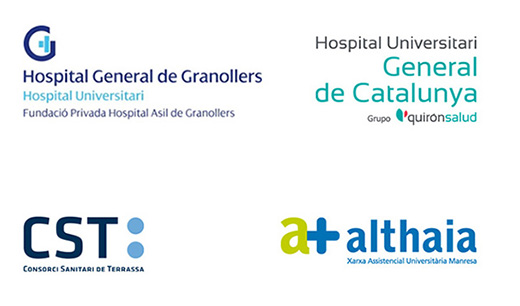
University primary care centre

Associated / collaborating centers
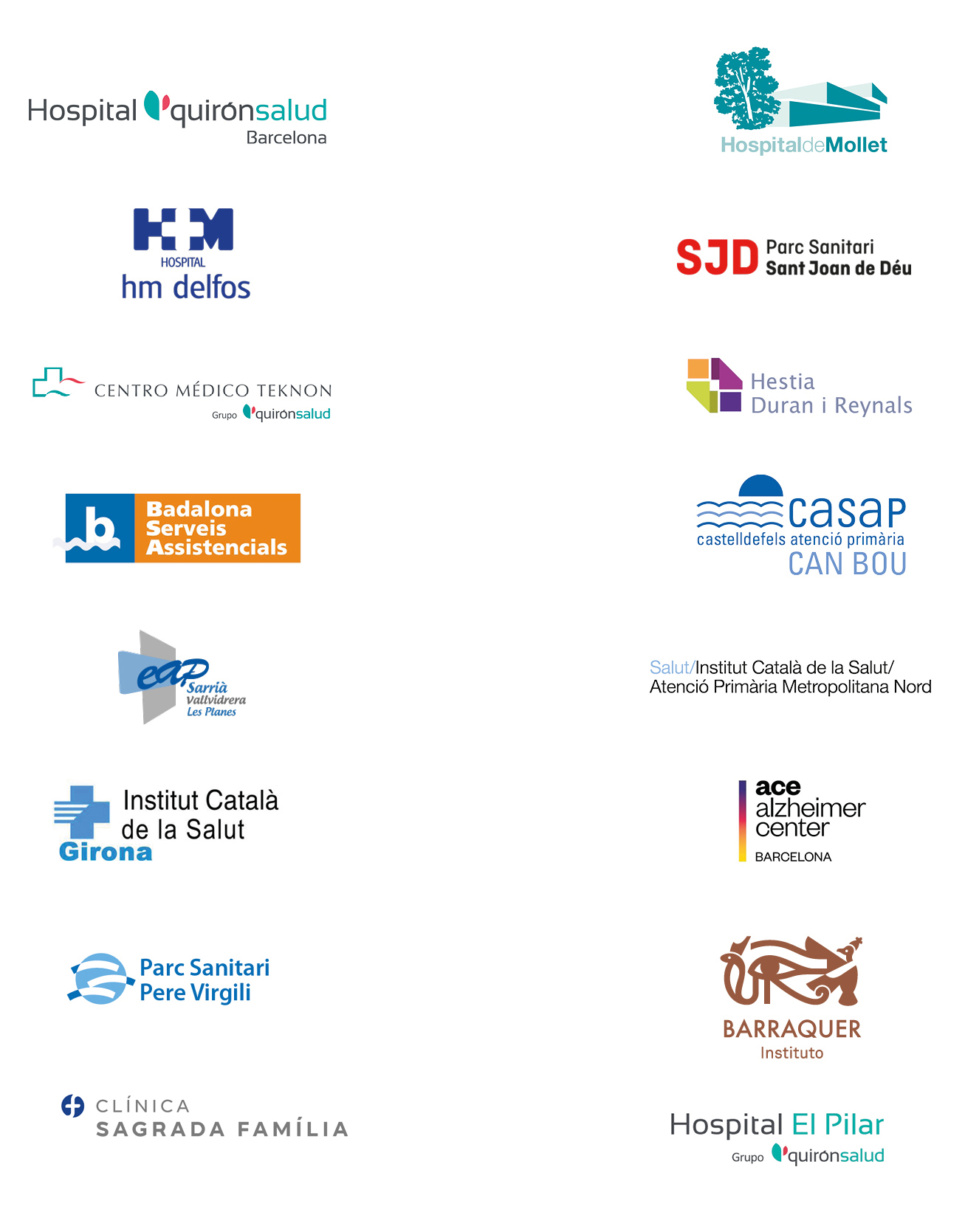
For us, practice is more powerful than theory, and the example of good professionals is our roadmap
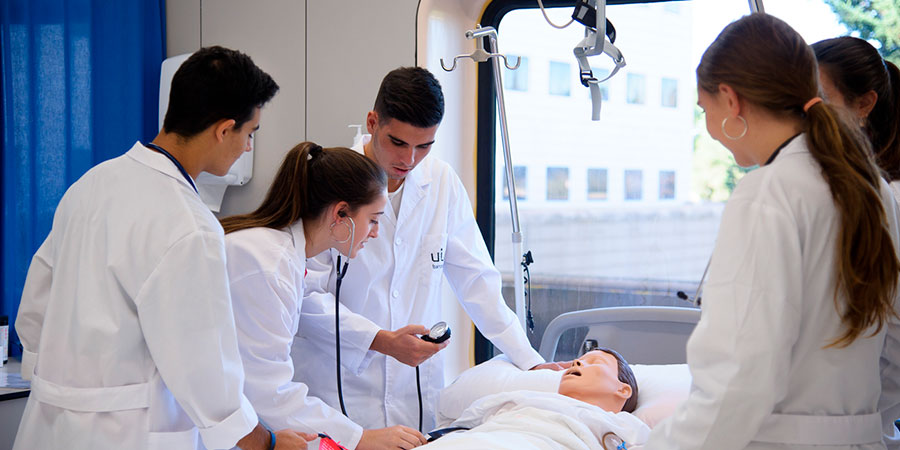
Comprehensive Centre for Advanced Simulation with more than 1,000 m2
It includes an outpatient area, home care area, surgical area, specialised area and hospital admission area with 16 beds. It also offers training, debriefing and image control rooms with video recording facilities in all settings. You will have access to the anatomy unit, with three dissection rooms, a bone library and the biochemistry laboratory.
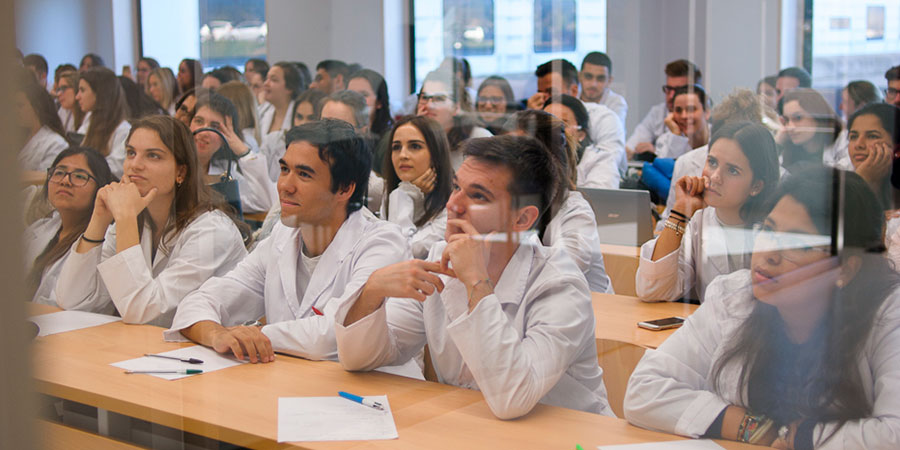
Excellent MIR results
98.5% of our students exceed the MIR cut-off mark.
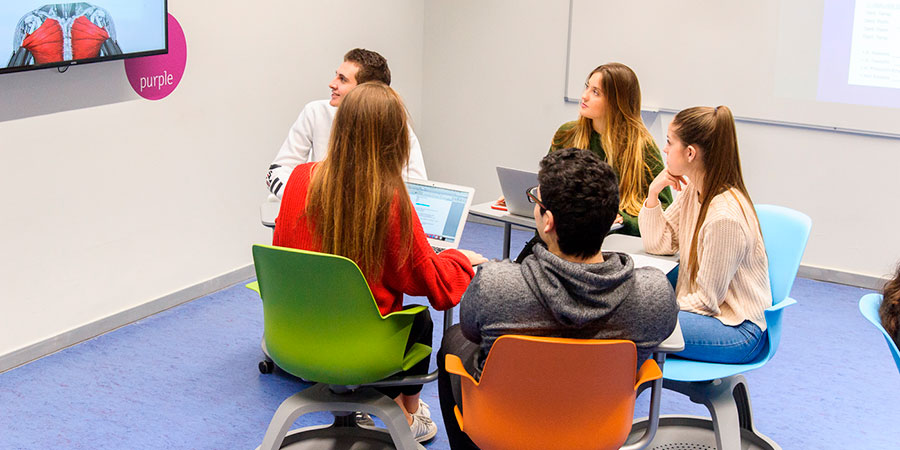
Active and multidisciplinary methodology
We work in small interprofessional groups, using active and innovative methodologies that are predominantly practical, with quality lecturers and in flexible spaces that enhance the implementation of these methodologies, with personalised care and counselling.
You will be capable of guiding any patient through the healthcare system
We offer you multiple career opportunities within clinical practice, management, teaching and research.
- Primary care
- Specialised care
- Social healthcare
- Mental healthcare
- Public and private sector
- National and international scope
- Healthcare management and administration
- Emergency medicine
- Workplace medicine
- Public healthcare
- Forensic medicine
- Teaching and biomedical research
- Pharmaceutical industry
- Healthcare technology
In their own words
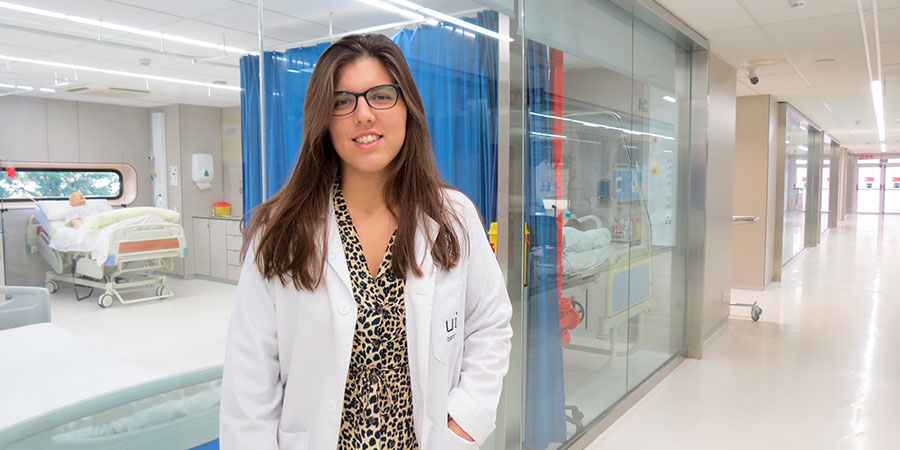
“During the Degree in Medicine, we learn the importance of medical ethics as a fundamental aspect of being good professionals. Technical knowledge in a doctor is a given, it is the humane quality of healthcare that makes the difference, and that's definitely our university's brand.”
Georgina Sauqué
Medicine student
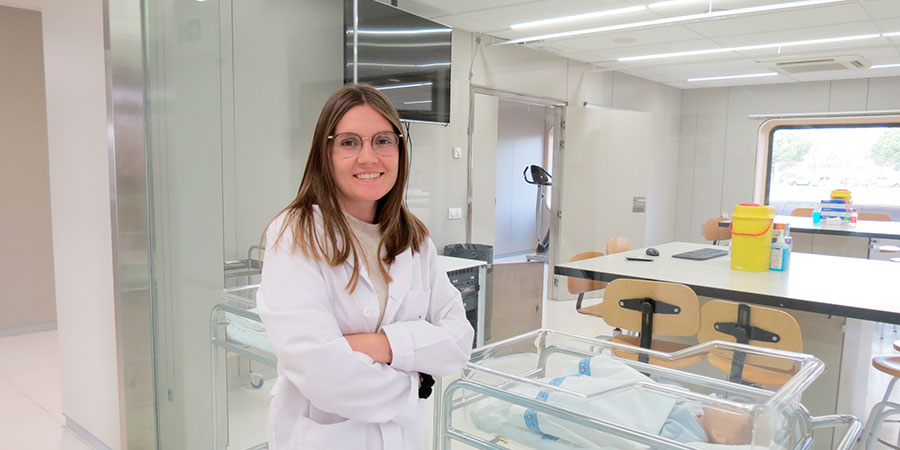
"What I would highlight about Medicine at UIC Barcelona is having hospital practice from year 1 at a wide range of hospitals, with an integrated professional team and individual tutoring.”
Marta Suñer
Medicine student
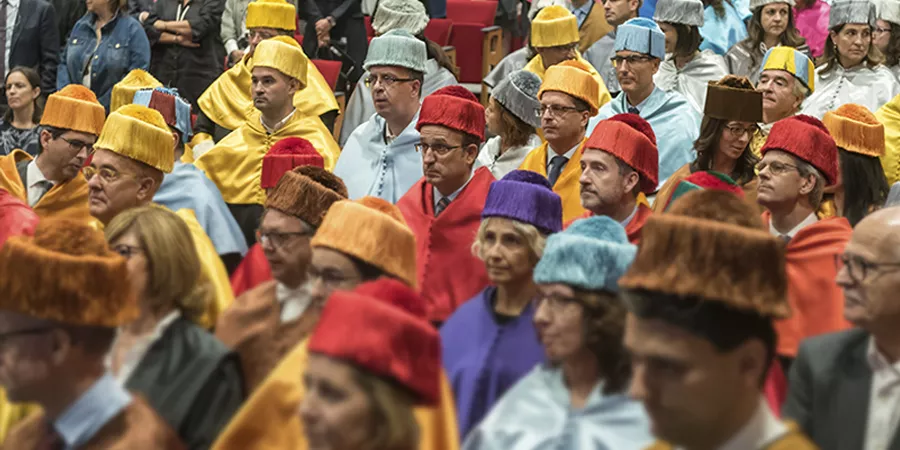
Professors and lecturers active in their field with multidisciplinary experience
In order to teach future professionals in the field of healthcare we have a teaching body that combines their teaching with exercising their profession in public and private hospitals and healthcare centres. They are also involved in important research activities both inside and outside the university. Direct contact with professional practice allows our professors and lecturers to transmit a comprehensive, multidisciplinary and human overview of the reality in the sector to students.
Medicine, an international bachelor's degree
11% of foreign students in official education. Students from 24 different countries.

Additional information
Contacte
- Contact details for student requests: alumnatmedicina@uic.es
- Contact details for faculty requests: professoratmedicina@uic.es
Presentation
The academic curriculum for UIC Barcelona’s Medicine Degree is focused on training students based on active educational methodologies with a strong emphasis on information technologies and communication. These teaching methodologies aim to train future doctors in what are known as transversal skills, including interpersonal communication skills, analysis and synthesis, the ability to work as part of a team, self learning, selective acquisition of information, developing a critical sense, etc.
Studying Medicine at UIC Barcelona brings students into contact with patients from an early stage, giving them the opportunity to gain first hand experience of the health system.
Later on students join one of the teaching units, which are accredited health centres, where they combine practical participation with guided study in the different subject areas.
Goals
Since the mid-sixties of the last century, there have been serious attempts at various faculties and schools to orient the curriculum towards competencies. The Flexner model that was imposed at the beginning of the 20th century is based on imparting and acquiring the knowledge that enables the good practice of medicine. The emphasis on competencies appears with the need to be sure that students who become professionals are truly capable of exercising the profession. The paradigm that assumes that acquiring adequate knowledge is synonymous with being a good professional enters a crisis, and a new paradigm is sought based on the demonstration that they really are good professionals.
Building objectives according to competencies seems very real from this point of view since it also means focusing on the results you want to achieve. Various institutions and universities have proposed and / or implemented competency-oriented study plans. We will highlight the efforts of the International Institute of Medical Education that has elaborated the Global Minimum Essential Requirements and has implemented them in a series of Chinese universities, and also the proposal of the National Agency for Quality Assessment and Accreditation contained in its White Paper on medicine studies. Even though the orientations of all these proposals are frankly similar, how could it be otherwise, the proposal of the UIC Barcelona curriculum that we present follows the competency scheme developed by the Faculty of Medicine of the University of Dundee, a center pioneer in medical education, because it is considered that they detail and specify better some of the competency dimensions of the medical profession that, in other proposals, are not so well characterized. Finally, it is not necessary to mention that the design of a plan by competences is consistent with the will to adapt to the philosophy of Bologna and to the directives that the Ministry of Education and the Commissioner of Universities of the Generalitat of Catalonia have prepared on this topic.
The curriculum that is presented wants to take advantage of its novelty to introduce all those characteristics that are convenient for the training of a doctor of the 21st century and that are more difficult to implement in schools with a strong tradition and history:
- Integration of subjects.
- Multidisciplinarity and interdependence.
- Relevance of local and regional factors (own culture, immigration, etc.).
- Internalization of the search as an instrument of personal and social progress, especially in improving the health of the environment.
- Early contact with the world of medicine and the healthcare system.
This study plan presents three large groups or chapters of competencies that are named based on what they describe:
- What the doctor is capable of doing.
- How the doctor does what he is capable of doing.
- How the doctor does, correctly, what he is capable of doing.
Each of these groups gathers a series of dimensions up to a total of twelve. The first two groups together the specific competencies that will be developed in the plan in an integrated way during the six years, based first on the large groups of organs and systems, and later on groups of care levels. The third chapter groups together what is understood as transversal competences, which are independent of organs, systems and levels of care, and are developed through a series of horizontal subjects that are taught in each course of the degree.
We could define this third group as that of “humanities and professionalism” in which the acquired skills and knowledge are applicable to any of the situations of professional, medical or any other practice.
The competences of the curriculum of the Degree in Medicine include the principles of respect for the dignity of the human person throughout his life cycle, the fundamental rights of equality between men and women, the promotion of human rights, and principles of universal accessibility and of values proper to a culture of peace and democracy.
Student profile
Candidates who meet the procedures and general requirements for access to the degree can apply for admission. However, the recommended profile is that of a person with previous training in the area of health sciences, with a vocational attitude towards science and medicine and in which the following skills stand out:
- Discipline, memory and dedication
- Ability to take on pressure and workload
- Psychological qualities and empathy
- Emotional balance
- Observation skills, interest in research
- Responsibility
- Teamwork and leadership
- Sensitivity to the pain of others
- Resilience
- Ease in decision making
Competences
Professional profile to be trained
- Focused on the needs of patients. That they be able to guide the patient in the efficient and adequate use of the health resources that they need at any time, carrying out a follow-up (stewartness) that benefits the patient and the system.
- With experience in mental health and geriatrics, in anticipation of population needs for the coming decades.
- Competent in bioethics. Aspect of medicine that woul have to permeate more and more the actions of the doctor, in the face of an increasing complexity of clinical decisions motivated by scientific advances and limited resources, among other factors.
- With a good anthropological base that allows them to interact with the patient, their families and other professionals, always keeping in mind the dignity of the human person in any situation.
Academic accreditation
Graduat o Graduada en Medicina per la Universitat Internacional de Catalunya.
Comittee of the faculty
Dean of the Faculty of Medicine and Health Sciences
- Dr. Esther Calbo Sebastián
Vice Dean of the Faculty of Medicine and Health Sciences
- Dr. Montserrat Virumbrales Cancio
- Dr. Esperanza Luisa Gómez Durán.
Teachers
- ABOUL- HOSN CENTENERO, Samir Carlos
- AGUDO UGENA, José Pablo
- AGUILAR MANDRET, Francina
- AGUILERA LÓPEZ, Manuel
- AIRA, Nicolas
- ALAMEDA QUITLLET, Francisco
- ALDEA MALO, Martí
- ALEGRET LLORENS, Maria Monserrat
- ALSINA CASANOVA, Miguel
- ÁLVAREZ DÍAZ, Pedro
- AMADOR GIL, Sara
- AMILLO ZARAGÜETA, Mireia
- ANDRÉS VILLARREAL, Mireia
- ANTON LÓPEZ, Alfonso
- APPIANI, Franco Emanuel
- ARANDA SANCHEZ, Miguel Jose
- ARBÓS VIA, Maria Antònia
- ARÉVALO GENICIO, Antonio Rafael
- ARTEAGA MEJIA, Daniel
- AYUSO MOLINA, Lucía
- AZAGRA LEDESMA, Rafael
- BADIA PÉREZ, Josep Maria
- BALAGUER SANTAMARÍA, Albert
- BALLESTEROS ALONSO, Ferran
- BALMAÑA GELPI, Judith
- BAÑERES JAÉN, Judith
- BARRAQUER COMPTE, Rafael Ignacio
- BAS CUTRINA, Francesc
- BAYÉS MARIN, Ivet
- BAYLINA MELÉ, Mireia
- BOADA ROVIRA, Mercè
- BOADAS MIR, Jaume
- BOIX PALOP, Lucía
- BOSQUE CEBOLLA, María Dolores
- BOTEY FERNÁNDEZ, Mireia
- BRAQUEHAIS CONESA, María Dolores
- BRU RULLO, Samuel
- BUEZO RIVERO, Oscar Luis
- BUSQUETS CARRERA, Oriol
- BUSTAMANTE ARAUJO, Marco Antonio
- CALBO SEBASTIÁN, Esther
- CALLE RODRÍGUEZ, Candelaria
- CALVO LÓPEZ, Laura
- CAMPAYO GUILLAUMES, Marc
- CAMPOY SANCHEZ, Antonio
- CAÑABATE GONZÁLEZ, María Pilar
- CANET VINTRÓ, Máxim
- CANO FERNÁNDEZ, Amanda
- CANTO RIVERA, María José
- CARMONA SANCHEZ, Margarita
- CASADEMUNT GRAS, Elena
- CASASA PLANA, Albert
- CASTELL PANISELLO, Eudald
- CASTELLVI OBIOLS, Pere
- CATALÀ PUIGBO, Margarita
- CIURANS MOLIST, Jordi
- COCHO CALDERÓN, María Dolores
- COLET MASEGOSA, Martí
- COLL SIBINA, Mª Teresa
- COMERMA COMA, Maria Isabel
- CORBELLA VIRÓS, Xavier
- CORCÓ JUVIÑÁ, Josep
- CORTADELLAS ROSEL, Tomas
- COSTA TRACHSEL, Irmgard
- COTS PONS, Marcos
- CROS COSTA, Sara
- CUADRA LLOPART, Leonor
- CUIXART COSTA, Lluis
- DE DIOS ORÁN, Elena
- DE GIORGI, Antonio
- DE IRIARTE GAY DE MONTELLA, Natalia
- DE LA TORRE RUBIO, Noelia
- DE PAZ CANTOS, Sonia
- DESOLA ALÀ, Jordi
- DE SOLÀ-MORALES SERRA, Oriol
- DIAS DA COSTA MAZZONI, Marcia
- DÍAZ CONRADI, Alvaro
- DÍAZ CORTÉS, Víctor Manuel
- DÍAZ DE CASTELLVÍ, Sandra
- DIETL GÓMEZ-LUENGO, Beatriz
- DÍEZ IZQUIERDO, Ana
- DURAN ROBERT, Ignasi
- DURAN VALLÈS, Francesc
- ELGUEZABAL RODRIGUEZ, Analía
- ELIZALDE MONTAGUT, Javier
- ESCRIBANO LÓPEZ, Francesc Xavier
- ESPAÑOL QUINTILLA, Isabel
- ESPINÓS RAMÍREZ, Carles
- ESPIN REARTE, Fabio
- ESTEBA BECH DE CAREDA, Maria Dolors
- ESTEVE SIMO, Vicente Juan
- FADÓ ANDRÉS, Rut
- FARRÉ MERCADÉ, María Victoria
- FAURA CORRAL, Isabel
- FERNÁNDEZ BORSOT, Gabriel
- FERNÁNDEZ DÍAZ-RULLO, Fernando
- FERNANDEZ FERNANDEZ, Santiago
- FERNÁNDEZ FIGUERAS, Maria Teresa
- FIGA BARRIOS, Raul
- FIORILLO, Raffaele
- GALCERÁN GUI, Josep Maria
- GÁMEZ CENZANO, Cristina
- GÁMIZ SANFELIU, María Guadalupe
- GARCIA CRUZ, Maria Aranzazu
- GARCÍA FORERO, Carlos
- GARCIA GIMENO, Oscar
- GARCIA GONZÁLEZ, Pablo
- GARCIA MARTINEZ, Montserrat
- GARCÍA MEDINA, Noemí
- GARCIA RESTOY, Enric
- GENÉ TOUS, Emilio Miguel
- GIL ESTELLER, Paula
- GIMÉNEZ ESBRÍ, Víctor
- GIMÉNEZ PÉREZ, Gabriel
- GIRVENT VILARMAU, Marta
- GÓMEZ DEL VALLE, Margarita
- GÓMEZ DURÁN, Esperanza Luisa
- GÓMEZ LA CRUZ, María Laura
- GONZÁLEZ DE OLANO, David
- GONZÁLEZ FARRE, Xavier
- GONZÁLEZ GONZÁLEZ, Julio
- GRIMALT SANTACANA, Ramon
- GUARDIOLA TEY, José Mª
- GUILABERT VIDAL, Antonio
- GUIRAO CANO, Luis
- HERNAIZ CALVO, Luis Maria
- HERNÁNDEZ VIEDMA, Gonzalo
- HERRANZ PÉREZ, Javier César
- HOYUELA ALONSO, Carlos
- HUAMAN RIOS, José Walter
- IBÁÑEZ FLORES, Nuria
- IZQUIERDO CASAS, Joan
- IZQUIERDO DOMÍNGUEZ, Adriana Elisabeth
- JIMÉNEZ JIMÉNEZ, Javier
- JOVELL FERNÁNDEZ, Esther
- JUANEDA CASTELL, María Begoña
- JÜRGENS MESTRE, Ignasi
- JUVANY GÓMEZ, Montserrat
- LAMARCA MATEU, José
- LASTRA MARTÍNEZ, Andrea
- LÁZARO GOTOR, Blanca
- LEÓN CABRERA, Patricia
- LIDÓN MOYANO, Cristina
- LLAMAS MEDINA, Cristina
- LLARGUÉS ROCABRUNA, Esteve
- LLEDÓ RODRÍGUEZ, Rafael
- LLONCH MASRIERA, Mireia
- LLUNELL CASANOVAS, Antonia
- LÓPEZ GÓMEZ, David
- LÓPEZ SÁNCHEZ, Rosario
- MACAYA PASCUAL, Antonio
- MADRAZO GONZÁLEZ, Zoilo
- MAIRAL FRAILE, Montserrat
- MALO BARRES, Roger
- MANOUSAKIS, Evangelos
- MARQUIÉ SAYAGUÉS, Marta
- MARTÍ DELGADO, Ana
- MARTÍ GUADAÑO, Enrique Antonio
- MARTÍN ANCEL, Ana María
- MARTÍN CULLELL, Berta Rosa
- MARTINEZ GARCIA, Maria
- MARTÍNEZ GONZÁLEZ, Maria Luisa
- MARTÍNEZ GRAU, Ainhoa
- MARTÍNEZ JAIMEZ, Patricia
- MARTÍNEZ LÁINEZ, Joan Marc
- MARTÍNEZ PÉREZ, Melcior
- MARTÍNEZ REGADA, Xavier
- MARTÍN FUMADÓ, Carles
- MASIP SALES, Núria
- MATIÑÓ SOLER, Eusebi
- MAZARICO GALLEGO, Edurne
- MAZARICO GALLEGO, José María
- MEGO SILVA, Marianela
- MENERO BULDO, Laia
- MESTRES FERRÉS, Ferran
- MIÑAMBRES CABAÑES, Carla
- MIRALLAS VIÑAS, Oriol
- MOLINS GAMISANS, Anna
- MORATÓ ARÚS, Xavier
- MORENO ALONSO, Deborath
- MORENO ROMERO, Juan Antonio
- MOTOS CABRERA, Jaime
- MUÑOZ ALMAGRO, Carmen
- MUÑOZ ESCUDERO, Marcos Roberto
- MUÑOZ HERNANDEZ, Fernando
- MUÑOZ SANTOS, Carlos
- NAVARRO GALMÉS, Miguel Angel
- NAVARRO PACHECO, Blanca Victoria
- OLMEDO BORJAS, Maria Luz
- OMS BERNAD, Luis Maria
- ORTIZ SANTAMARIA, Vera
- PALLÁS ALBIAC, Rodrigo José
- PAMIAS MASSANA, Montserrat
- PANTALEONI GIRALT, Albert
- PAPALEO, Natalia Florencia
- PASCUAL ROMERO, Marta
- PEDRAGOSA VALL, Angels
- PEIG FONT, Anna
- PEÑA GONZALEZ, Juan Antonio
- PÉREZ BELLMUNT, Albert
- PÉREZ MUÑOZ, Noelia
- PÉREZ PARDO, Ana María
- PERNA SCHWAB, Alan
- PILES GALDON, Salvador Pascual
- PIQUERAS MARQUÉS, Jorge
- PONCE FERNÁNDEZ, Andrés
- PONT SUNYER, Maria Claustre
- PRAT COLILLES, Eugeni
- PRIM BOSCH, Nuria
- PUIG TRESERRA, Ramon
- PUYALTO DE PABLO, Paloma
- PYTEL CÓRDOBA, Vanesa Verónica
- QUANDT HERRERA, Eva
- RELLO CONDOMINES, Jordi
- REVENTÓS PUIGJANER, Jaime
- RIGAU CAÑARDO, Joaquin
- RIVAS FERNÁNDEZ, Maria Angeles
- ROBERT CALVET, Ivan
- ROCA COMELLA, Beatriu
- RODRIGUEZ GONZALEZ, Daniel
- RODRÍGUEZ MAIZTEGUI, Idoia
- RODRIGUEZ SANZ, Jacobo
- ROJO RODES, José Emilio
- ROMERA BAURES, Montse
- ROMERO MENOR, Cesar
- ROSENDE-ROCA RODRÍGUEZ, Maitee
- ROSINÉS CUBELLS, María Dolores
- ROZADILLA SACANELL, Antoni
- SALINAS ARGENTE, Ramón
- SALINAS BECERRA, Cristina
- SALINAS DUFFO, David
- SÁNCHEZ FERNÁNDEZ, Juan José
- SÁNCHEZ GARCÍA, Almudena
- SANCHEZ HIDALGO, Antonio
- SÁNCHEZ MARTÍNEZ, Néstor
- SÁNCHEZ SCHMIDT, Júlia María
- SÁNCHEZ SITJES, Lluís
- SAN GIL BETRIU, Anna
- SANTUY MUÑOZ, Andrea
- SAUMENCH PERRAMON, Roser
- SEGURA GRANADOS, Javier
- SERRA CARRERAS, Jordi
- SERRA MESTRE, Josep Maria
- SERRA RENOM, Jose Maria
- SIEIRA GIL, Ramón
- STANTONYONGE SESNIC, Nicole
- SUBIRÀ CASELLES, Maricel
- SUBIRANA POZO, Francesc Xavier
- TÁRREGA CAMARASA, Julia
- TORTOSA TRANCHO, Laura
- TOST VALLS, Jose Ramon
- TRIAS PUIG SUREDA, Isabel
- VALASSI, Elena
- VALDÉS CASTIELLO, César
- VALLS ONTAÑÓN, Adaia
- VALVERDE VILAMALA, Ivanna
- VARGAS VILARDOSA, Elena
- VEGA CASTRO, Maria Aránzazu
- VELASCO CONDADO, Pablo
- VELASQUEZ ESCANDÓN, Cesar Andres
- VICENTE LAZCANO, Maria Pilar
- VILA GARCIA, Judith
- VILLAVICENCIO CHÁVEZ, Christian Antonio
- VIÑAS DOMINGO, Marta
- VIÑAS USÁN, Ferran
- VIRUMBRALES CANCIO, Montserrat
- XIBERTA PONS, Joan Manel
- YAHYA METWALLY, Galal
- ZABALZA CERDEIRIÑA, Miguel
- ZEGRÍ DE OLIVAR, María Eugenia
- ZORRILLA RIVEIRO, José Gregorio
Internship
We believe that clinical practicums are a fundamental part of learning about the medical profession, and that tutors, as rigorous professionals, are the vehicle that makes this learning possible.
Objectives
The main objective for these clinical practicums is to help students acquire the knowledge, skills and attitudes of a general practitioner so that they can carry out the profession confidently and independently. Students learn through hands-on experience and by observing the numerous professional roles involved in caring for patients. They are accompanied at all times by a tutor who supervises and facilitates their learning.
The practicums are carried out in different areas of healthcare (primary care, accident and emergency, medical and surgical services, social-healthcare, etc.). By gaining such broad experience, students will become familiar with professional medical roles and see how each of these healthcare services functions.
Throughout the practicums, students will have the chance to care for patients and put their ‘student-patient’ relationship into practice, including communication skills and empathy, as well as seeing the essential role teamwork plays in healthcare environments.
In order to gain this knowledge, the programme includes practical subjects with clearly defined objectives, methodologies and assessment systems, which are outlined in the corresponding syllabuses.
Organisation of the clinical practicums.
From third to fifth year:
The clinical practicums are organised as subjects from the third to fifth year and culminate in the sixth ‘rotatory’ year of the bachelor’s degree.
Each subject has a syllabus that outlines its fundamental aspects: objectives, methodology, skills to be acquired, and finally, the assessment system. It is very important to bear these aspects in mind as they will serve as a guide for students to follow independently wherever they carry out their practicums.
During the practicums period, students will also attend four workshops on personal development and growth over the course of one week. These workshops will focus on cross-disciplinary skills centred around individual and healthcare-related values, strengths to help with decision-making, tips for managing one's emotions and personal and interpersonal communication.
|
Academic Year |
Subject |
Practicum Location |
Duration |
|
3rd |
Medical clinical practicum I |
Internal medicine Geriatrics |
5 weeks |
|
4th |
Medical clinical practicum II
Surgical practice
|
Medical specialities
General surgery and surgical specialities |
4 weeks
4 weeks |
|
5th |
Primary care (PC) Paediatrics Elective Practicums Dermatology in Practice Critical Medicine: Protocols in Immediate Action Ophthalmology in Practice Oncology in Practice Sports Traumatology From Cognitive Normality to Dementia: Practical experience in Clinical, Research and Translational Medicine
|
Primary Care Centres (CAPs) Paediatric services Dermatology Services Intensive Medicine Services Ophthalmology Services Oncology Services Traumatology Services ACE Foundation
|
2 weeks 4 weeks
2 weeks 2 weeks
2 weeks 2 weeks 2 weeks 2 weeks |
Sixth academic year
The sixth and final year of this bachelor’s degree is highly practical. Students will be supervised by a clinical tutor and will practice medicine with greater autonomy, which represents a qualitative leap forward compared to the clinical practicums carried out in previous years.
The aim is for students to rotate through different levels of care and clinical specialities and acquire a skill set of a professional standard that allows them to treat more complex conditions, implement their knowledge and skills, make accurate decisions and develop ethical attitudes, values and behaviour centred around the patient.
The rotatory year is made up of six subjects:
|
Subject |
Duration |
|
Medical specialities rotation |
9 weeks |
|
Surgical specialities rotation |
9 weeks |
|
Primary care rotation |
2 weeks |
|
Free rotation |
6 weeks |
|
Social-healthcare rotation |
2 weeks |
|
Social services rotation |
2 weeks |
The social services rotation helps expose students to the humanistic and social side of medicine as well as healthcare-related altruism.
The following activities will also be carried out alongside the rotation schedule:
- Six 12-hour on-duty shifts All information related to this activity can be found in the Rotation Guide.
- Knowledge and skills integration sessions: from January These are on-site sessions and help to reinforce students’ learning.
- Supervision of the rotatory year by an academic tutor who will help students reflect upon their learning process over the course of the academic year.
Internships mainly take place at Universitary and Associate Hospitals:
Universities
- Fundació Privada Hospital-Asil de Granollers
- Hospital Universitari General de Catalunya
- Consorci Sanitari de Terrassa (CST)
- Fundació Althaia Manresa
University primary care centre
Associated / collaborating centers
- Hospital Quirónsalud Barcelona
- Fundació Sanitària Mollet
- Hospital HM Delfos
- Parc Sanitari Sant Joan de Déu Sant Boi
- Centro Médico Teknon
- Hestia Durans i Reynals
- Badalona Serveis Assistencials
- Consorci Castelldefels Agents de Salut (CASAP)
- EAP Sarrià
- CS Metropolitana Nord
- ICS Girona
- Fundació ACE
- Parc Sanitari Pere Virgili
- Centro de Oftalmologia Barraquer
- Hospital el Pilar
- Hospital Quirón Salud del Vallès
Final Degree Project
Presentation
The Final Degree Project (FDP) is carried out during the sixth year. Through the FDP students develop autonomously and supervised by a tutor a research project or scientific article that they have to defend publicly before a research committee.
It is intended that students demonstrate their level of professional competence in their approach to a research project related to medicine in its different areas. In this way, they must put into practice the knowledge acquired with respect to research and the genesis of knowledge that will prepare them to obtain a doctorate degree if they wish to acquire it.
Research projects or articles can be framed within the following research areas:
- Basic sciences
- Applied sciences, clinical research
- Biostatistics, epidemiology and public health
- Medical education
- Sociology of medicine, anthropology and bioethics
The modalities of the FDP are, among others, the following:
- Basic research project and specific laboratory work
- Clinical, translational or applied research project
- Epidemiological or public health research project
- Research project in medical education
- Social research project applied to the field of health
Previous requirements
In order to carry out the defense act, 300 credits corresponding to the first to fifth courses must be approved.
To enroll in the FDP, students must have passed the following research-related subjects:
- Basic concepts in experimental research
- Biostatistics
- Introduction to epidemiology
- Management of scientific information (IMM2)
- Clinical Epidemiology and Public Health
Objectives
The objectives of the FDP are:
- Encourage the integration of the knowledge and skills in research acquired so far.
- Familiarize students with the development of competitive study proposals in the different research fields.
- Prepare students for the development of a critical and rigorous mind in the evaluation of research projects.
- Provide tools for the public presentation of research projects.
Medical Education Unit
Medical Education Unit
The Medical Education Unit depends directly on the Director of the Department and helps in the correct development of the curriculum and the improvement of the teaching quality of the teaching staff.
This unit ensures the quality of teaching, through the initial and continuous training of teachers according to the needs detected and advances in Medical Education at national and international level, encouraging innovation, promoting adaptation to new teaching and assessment methodologies and very especially in the clinical simulation environment.
Its main function is to promote the development of teachers' teaching skills by ensuring their training, promoting innovation in the classroom, promoting research in Medical Education and implementing improvement actions identified by the Quality Commission or promoted by the Department Board.
Objetives:
- Ensure a high quality of learning
- Improve the teaching quality of teachers
- Advise on teaching innovation
- Promote the performance of research work in Medical Education
Priority lines of research:
- Competence assessment
- Development of transversal competences in the Degree in Medicine
- Interprofessional training, development of professionalism
- Learning methods and new pedagogical strategies
Members:
The Medical Education Unit includes members of the Centre Board, teachers with experience and interest in the field of medical education, methodological and statistical support staff.
Prerequisites & admissions
2024- 2025 academic year: Admission process for the Bachelor's Degree in Medicine
The admission process for the Bachelor’s Degree in Medicine is aimed at applicants who would like to study Medicine at UIC Barcelona during the 2024- 2025 academic year. In order to start this process, applicants must follow the following steps.
Admissions process
If you want to begin the admission process you must fill out the admission application. Once you have taken this step, you will receive the codes to access the Admissions Portal. Please check the Promotions and Junk Mail folder.
On the platform, you will see the documentation that you must upload in order to take the tests. It is very important that you correctly mark your access route on the form since the documents you must upload will depend on the access route you mark.
Once all documents have been validated, you will receive an email with instructions to make the payment of €100 for the entrance exam. Once we receive your payment, we will be able to confirm your place for the entrance exam.
All of these steps must be completed before we close the admission process in April approximately.
See details of admission process
Entrance exams
DATE TEST ADMISSION: Saturday, May 11, 2024
The admission test will be offered in two formats depending on your residence.
- Students currently residing in Catalonia must take the exam on-site at the Sant Cugat Campus of UIC Barcelona.
- Students currently living outside Catalonia can take the exam online.
In both cases the schedule will be in the morning (approximately 9.00 h to 13.00 h).
The entrance exams are in Spanish and are multiple choice, except for the structured written interview. There is no penalty for wrong answers. Calculators cannot be used and we do not provide practice exams from previous years.
The entrance exam for the Bachelor’s Degree in Medicine consists of:
- Specific biology, chemistry and mathematics knowledge test
1st year upper secondary school level. The aim is to assess the basic knowledge required to study Medicine. - Emotional intelligence test
This test assesses some of the characteristics relating to the applicant’s professional profile based on their responses to certain everyday situations. It is important to answer honestly, as the internal consistency of the answers is taken into account. - Structured written interview
All applicants will do a structured written personal interview the same day as the entrance exam. It may be answered in any of the three official languages of UIC Barcelona: Catalan, Spanish or English. This interview is only corrected for the applicants ranked in the top 220 positions.
Test assessment and weighting
Applicants to the Bachelor’s Degree in Medicine are ranked according to the following items and weightings:
- Academic record (50%)
- Entrance exam (50%)
Specific biology, chemistry and mathematics knowledge test (25%)
Emotional intelligence test (25%)
Structured written interview (no percentage, can raise or lower decimals or maintain the mark)
Exam results
Applicants will be able to know the decision within a period of three weeks from the day of the exam through the Admissions Portal.
There are different types of decisions:
- Admitted: the applicant has been admitted to the Bachelor’s Degree in Medicine and may download the acceptance letter they need to make the payment to reserve their place, which is equivalent to 20% of the price of the 1st year* and thereby confirm their place at UIC Barcelona. We will begin requesting the documents needed for enrolment based on the applicant’s access route in July.
*Place reservation is non-refundable. - Pending: the applicant has been placed on the wait list. They are not accepted for admission, but pending a possible vacancy. If admitted, the applicant will be informed via email. Results will not be provided by telephone.
- Not accepted: this means that the applicant has been excluded from the admission process to the Bachelor’s Degree in Medicine. Definitive decision.
Information to keep in mind
- We offer 15 seats for students who have initiated or completed any other university degrees.
Credit recognition or validation
Record transfer (medical students from other institutions)
Accepting student record transfers is subject to the places that are available after the current academic year has closed. All of the studies to be validated or recognised will be reviewed during the academic year when admission occurs.
Each record transfer review request will be evaluated, and the applicant will be asked to come to an online interview to give them the results of the review. The interview dates for academic record transfers for the 2024- 2025 academic year are:
Thursday, 7th of March
Deadline for students to submit their admission documents:
22nd of February 2024
Tuesday, 16th of April
Deadline for students to submit their admission documents:
19th of March 2024
Credit recognition and transference
Credit recognition (students who are admitted after the entrance exams)
Once the student has been admitted, the Faculty of Medicine’s Transfers and Credit Recognition Committee will review the studies to be validated. Validation or recognition reviews will only be undertaken during the academic year when admission occurs.
An email will be sent to all admitted students who can request a transfer validation review to inform them of the documents required and the deadlines for submitting them.
Admission process for two or more degree programmes
Applicants who would like to earn other degrees at UIC Barcelona must fill in an online application for each of the degree programmes they have chosen on our website and provide the documents each degree programme requires.*
* Exam fees apply to each admission test taken.
You must take the entrance exam for each degree programme you choose.
Contact details
Anaïs Rey
arey@uic.es
Information and Admissions Service: 935 042 000
Ranking
Reception of 1st year students takes place on Welcome Days at the beginning of the academic year. If you want to see the Welcome Days programme, download the document here:
1st Year Students are also issued the Book of support resources for students.
Continuation of studies
Article 9 of the Internal Regulations for Academic Management, approved on 05/15/2017, on enrollment credits by course and permanence regime, is modified for the Degree in Medicine in the following terms (applicable from the 2018-2019 academic year):
- In order to continue the degree studies, the student must have passed 60% of the credits enrolled in each course, except for the first academic year, in which the student must have passed a minimum of 40 ECTS and, in the second year, a minimum of 90 ECTS corresponding to the subjects of the first two academic years.
Grants & financial aid
Grants
UIC Barcelona offers various fellowships supported by both public institutes (MEC or AGUAR) as well as private UIC Barcelona funds.
For further information, please check with our admissions department:
Financial aid
Each payment method is adhered to the specific financing conditions of each degree programme.
Please see the attached document for details on these conditions:
Discounts
Those seeking undergraduate degrees at UIC Barcelona may be eligible for different discounts depending on their circumstances.
Faqs
General information
How many places are available on the Bachelor’s Degree in Medicine?
100 places.
How much does the first year of the Bachelor’s Degree in Medicine cost?
Please visit here for the most up-to-date information.
What kind of grants or funding can I get to study Medicine at UIC Barcelona?
Please visit here for more information.
Do students need to buy books or any other additional materials for classes?
Teaching material can be found on the University’s digital platform and at the Library. There are no elevated costs associated with the material.
When will classes be held?
Theoretical-practical classes are held in the afternoon (usually between 2 p.m. and 8 p.m.). Practical laboratory sessions (biology, pharmacology, dissection, skeleton, etc.) usually take place in the morning. Clinical practicums at healthcare centres are also held in the morning.
When do the practicums start?
All subjects have a strong practical component, combining theoretical and practical classes, in small groups, carried out in the laboratories, in the simulation center and, from the third year onwards, intensifying with internships in the clinical environment (supervised clinical internships). The last year (6th rotation) is eminently practical and includes 30 weeks of internships.
Access routes
What academic transcript mark is required alongside the entrance examination for UIC Barcelona?
The mark you received in your most recently completed academic year is taken into account. Therefore, if you are in your 2nd year of upper secondary school, the mark you obtained from your 1st year will be taken into account. If you have already finished upper secondary school, we will look at the mark from your 2nd year and so on.
Can I apply for the entrance examinations if I have social, humanities or artistic upper secondary qualifications?
Yes. You must take into account the fact that the entrance examinations involve specific tests on biology, chemistry and mathematics at first year upper secondary level.
Entrance exams and the admission process
THERE WILL BE A SINGLE ENTRANCE EXAMINATION. IT WILL BE HELD IN PERSON ON SATURDAY 11 MAY, 2024.
How many people attend the entrance examinations?
Around 550.
In what format will the admission tests be conducted?
The admission test will be offered in two formats depending on the student’s residence. - Students currently residing in Catalonia must take the exam in classroom format at the Sant Cugat Campus of UIC Barcelona. - Students currently residing outside Catalonia can take the exam in online format.
Can I look up past entrance exam papers?
We do not have sample tests available
Is the examination multiple choice?
Yes, except for the structured written interview.
How are the marks from both my academic record and the entrance examinations weighted?
50 % is attributed to the marks from your academic record and 50 % from the entrance examinations.
What are the exam times?
From 9 a.m. to 1 p.m. approximately.
How long do the exams take?
The entrance examinations last between four and five hours, which will be distributed as follows:
- Emotional intelligence test
- A specific biology, chemistry and mathematics test
- Structured written interview
Is it necessary to have a B2 level of English to take the tests?
No, it is not necessary.
When will I find out the results of the entrance exams?
The results will be sent via email approximately 15 working days after the exams have been taken.
If I’m on the waiting list, when will I find out the final results?
The waiting list will definitively close two weeks following the start of classes (end of September). Also, until the pass marks are published by the state universities, there will be little movement on the waiting lists.
If I am accepted, what is the next step?
You will receive a letter of admission containing information about the next steps to take in order to reserve a place on the course. This corresponds to 20% of the fee for the first year.
If in the end I choose not to study at UIC Barcelona after having reserved a place, will the reservation fee be refunded to me?
The reservation fee will only be refunded if you do not pass your upper secondary school or PAU (national Spanish university entrance examinations) exams. This clause is laid out in our General Terms and Conditions.
International mobility
Study abroad temporarily
Spend a semester or a full academic year at one of your Faculty’s partner universities or find an institution abroad to do an internship.
If you want to know the specific requirements of outgoing mobility of the Degree in Medicine, download the document
Check out the "Study abroad" section to access all the information you need to know before, during, and after studying abroad.
- Mobility oportunities and requisites
- UIC Barcelona Bachelor's Degree in Medicine in mobility agreements
In addition, you may:
- Attend the Berkeley Summer Sessions (extracurricular activity) the world’s best public university.
Study with us temporarily
If you are studying at another Spanish or foreign university, you can come to UIC Barcelona to study temporarily for one semester or a full academic year.
"If you want to know the specific requirements of outgoing mobility of the Degree in Medicine, download the document
